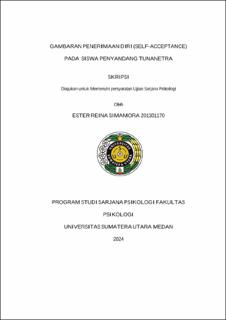| dc.description.abstract | The limitations of blind people cause them to have various behavioral problems that interfere with their activities, including social emotional difficulties, learning processes, and a person's ability to accept themselves. Individuals who do not accept themselves cause feelings of being easily offended, and being overly dependent on others. Blindness in adolescents will experience significant changes that have an impact on self-acceptance, this happens because individuals are in a period of searching for identity and recognition from the environment. so this study aims to find out and understand how self-acceptance is depicted in blind students. This study uses a qualitative method with an intrinsic case study approach. Data collection using structured interviews and participant observation. The research subjects consisted of three totally blind subjects aged adolescents; the first blind since birth (LI), the second (BN) blind due to an accident at the age of 10 years. Subject III (AT) has poor vision which is exacerbated when he falls at the age of six. The results of the study showed that the three subjects were already at the stage of self-acceptance, but each subject had a different time in their self-acceptance process, this was influenced by various factors. As for the supporting factors, they have accepted themselves because each subject has factors that influence them, such as a pleasant attitude towards society, no emotional barriers, self-understanding, realistic expectations, no environmental barriers, and having good identification. | en_US |


